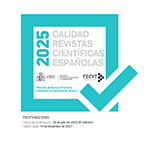Generation Z vs. Misinformation: Perceptions and Practices in the Digital Age
Abstract
Young people between 16 and 24 years old, commonly known as Generation Z, post-millennials, or centennials, are the first generation to have had very easy and frequent access to the Internet from an early age. As a result, they have been exposed, unlike any generation before them, to a constant presence of technology and digital resources, both in their educational process and in their personal lives. This article analyzes the perception of fake news within Spanish society, with a particular focus on the young members of Generation Z. Some of the objectives of this research include understanding which media they consult, what motivates them to share certain content on social media, and how they approach the problem of misinformation. To achieve this, a mixed methodology combining a survey study and focus groups was employed, providing a more comprehensive and nuanced view of the phenomenon. The results demonstrate that these young people constitute the most disruptive demographic group in the traditional communication process, while also being the most exposed to social networks and the most indifferent to both traditional media and the phenomenon of disinformation.
Downloads
Article download
License
In order to support the global exchange of knowledge, the journal Estudios sobre el Mensaje Periodístico is allowing unrestricted access to its content as from its publication in this electronic edition, and as such it is an open-access journal. The originals published in this journal are the property of the Complutense University of Madrid and any reproduction thereof in full or in part must cite the source. All content is distributed under a Creative Commons Attribution 4.0 use and distribution licence (CC BY 4.0). This circumstance must be expressly stated in these terms where necessary. You can view the summary and the complete legal text of the licence.










